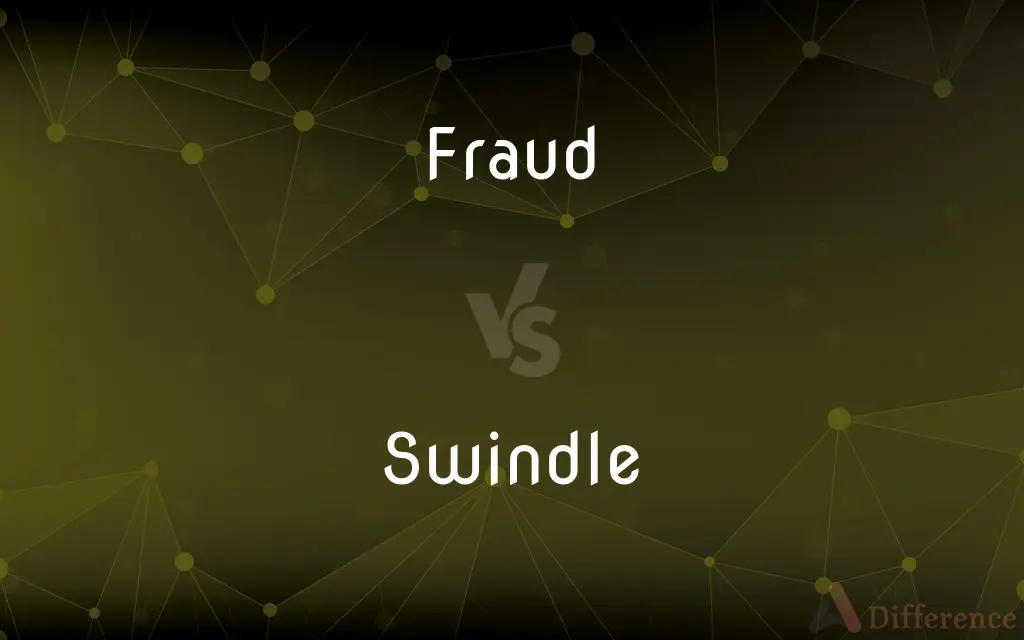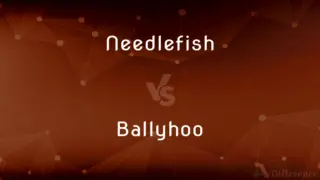Fraud vs. Swindle — What's the Difference?
By Tayyaba Rehman — Updated on September 14, 2023
Fraud is a broad term referring to dishonest practices for personal gain, while Swindle is a specific type of fraud that usually involves tricking someone out of money or property. Both involve deceit but vary in scope and mechanism.

Difference Between Fraud and Swindle
Table of Contents
ADVERTISEMENT
Key Differences
Fraud is a comprehensive term that refers to any intentional deception made for personal gain or to damage another individual. Swindle, in contrast, is a specific type of fraud, generally involving schemes or manipulations to cheat someone out of money or property.
Fraud can manifest in various sectors like finance, healthcare, and law. Swindle is often more narrowly focused, typically involving some sort of monetary deception or trickery.
In legal terms, Fraud is often the umbrella term under which various deceptive practices, including Swindle, fall. While Fraud is generally a legal concept, Swindle is often viewed as one of its subsets, a specific modality of fraudulent behavior.
In daily language, we often use Fraud to describe a variety of dishonest behaviors, whether it’s forging documents or making false statements. Swindle is used more specifically to describe deceptive tactics like scams, cons, and schemes that are intended to deceive someone out of money or property.
Comparison Chart
Scope
Broad
Specific
ADVERTISEMENT
Focus
Various sectors
Usually monetary
Legal Status
General legal term
Subset of fraud
Mechanism
Various means
Trickery, deception
Subject Matter
Money, identity, etc.
Primarily money/property
Compare with Definitions
Fraud
False Representation
Faking your identity is a form of fraud.
Swindle
Cheating Someone
He swindled investors with a Ponzi scheme.
Fraud
Unlawful Gain
Insurance fraud involves false claims for financial benefit.
Swindle
Targeted Deception
The swindle targeted elderly individuals.
Fraud
Intentional Deception
The investor was charged with fraud for misleading his clients.
Swindle
Scheme to Deceive
The email scam was a clear swindle.
Fraud
Dishonest Practices
Corporate fraud includes embezzlement and insider trading.
Swindle
Monetary Trickery
The con artist tried to swindle her out of her life savings.
Fraud
In law, fraud is intentional deception to secure unfair or unlawful gain, or to deprive a victim of a legal right. Fraud can violate civil law (e.g., a fraud victim may sue the fraud perpetrator to avoid the fraud or recover monetary compensation) or criminal law (e.g., a fraud perpetrator may be prosecuted and imprisoned by governmental authorities), or it may cause no loss of money, property, or legal right but still be an element of another civil or criminal wrong.
Swindle
To cheat or defraud of money or property.
Fraud
A deception practiced in order to induce another to give up possession of property or surrender a right.
Swindle
To obtain by fraudulent means
Swindled money from the company.
Fraud
A piece of trickery; a trick.
Swindle
To practice fraud as a means of obtaining money or property.
Fraud
One that defrauds; a cheat.
Swindle
The act or an instance of swindling.
Fraud
One who assumes a false pose; an impostor.
Swindle
(transitive) To defraud.
The two men swindled the company out of $160,000.
Fraud
(law) The crime of stealing or otherwise illegally obtaining money by use of deception tactics.
Swindle
(ambitransitive) To obtain (money or property) by fraudulent or deceitful methods.
She swindled more than £200 out of me.
Fraud
Any act of deception carried out for the purpose of unfair, undeserved and/or unlawful gain.
Swindle
(chess) for a player in a losing position to play a clever move that provokes an error from the opponent, thus achieving a win or a draw
Fraud
The assumption of a false identity to such deceptive end.
Swindle
An instance of swindling.
Fraud
A person who performs any such trick.
Swindle
Anything that is deceptively not what it appears to be.
Fraud
(obsolete) A trap or snare.
Swindle
(chess) when a player in a losing position plays a clever move that provokes an error from the opponent, thus achieving a win or a draw
Fraud
(obsolete) To defraud
Swindle
To cheat defraud grossly, or with deliberate artifice; as, to swindle a man out of his property.
Lammote . . . has swindled one of them out of three hundred livres.
Fraud
Deception deliberately practiced with a view to gaining an unlawful or unfair advantage; artifice by which the right or interest of another is injured; injurious stratagem; deceit; trick.
If success a lover's toil attends,Few ask, if fraud or force attained his ends.
Swindle
The act or process of swindling; a cheat.
Fraud
An intentional perversion of truth for the purpose of obtaining some valuable thing or promise from another.
Swindle
The act of swindling by some fraudulent scheme;
That book is a fraud
Fraud
A trap or snare.
To draw the proud King Ahab into fraud.
Swindle
Deprive of by deceit;
He swindled me out of my inheritance
She defrauded the customers who trusted her
The cashier gypped me when he gave me too little change
Fraud
Intentional deception resulting in injury to another person
Swindle
Specific Fraud
Swindle often involves deceitful tactics.
Fraud
A person who makes deceitful pretenses
Fraud
Something intended to deceive; deliberate trickery intended to gain an advantage
Fraud
Legal Offense
He was convicted of mail fraud.
Common Curiosities
What is Fraud?
A broad term for intentional deception made for personal gain.
Where is Fraud commonly found?
In various sectors like finance, healthcare, and law.
Is all Swindle considered Fraud?
Yes, Swindle is a subset of fraud.
How does Fraud affect victims?
In multiple ways, including financial loss or damaged reputation.
Is Swindle premeditated?
Usually, it involves planned schemes or tactics.
What is Swindle?
A specific type of fraud focused on monetary trickery.
Is all Fraud considered Swindle?
No, Fraud has a broader scope.
Is Swindle also a legal term?
Yes, but often as a specific charge under fraud.
Is Fraud always planned?
Typically, as it involves intentional deception.
Is Swindle always about money?
Usually, it involves tricking someone out of money or property.
Is Fraud a legal term?
Yes, it is commonly used in legal contexts.
Can Fraud occur online?
Yes, as in the case of online scams or identity theft.
Can a company Swindle?
It can, usually by deceptive business practices.
Can a company commit Fraud?
Yes, as in the case of corporate fraud.
Who are the common targets of Swindle?
Often individuals, sometimes vulnerable groups.
Share Your Discovery

Previous Comparison
Needlefish vs. Ballyhoo
Next Comparison
Diamond vs. IceAuthor Spotlight
Written by
Tayyaba RehmanTayyaba Rehman is a distinguished writer, currently serving as a primary contributor to askdifference.com. As a researcher in semantics and etymology, Tayyaba's passion for the complexity of languages and their distinctions has found a perfect home on the platform. Tayyaba delves into the intricacies of language, distinguishing between commonly confused words and phrases, thereby providing clarity for readers worldwide.















































